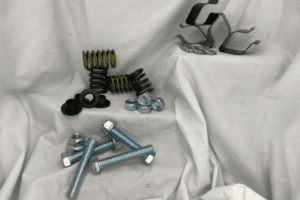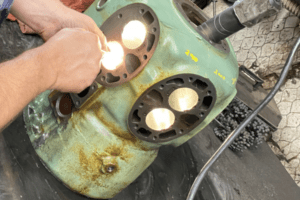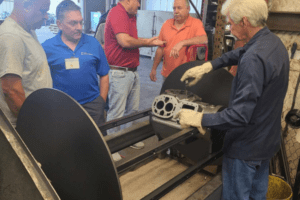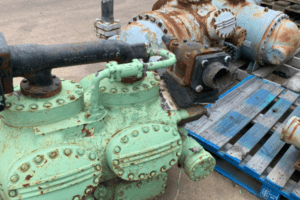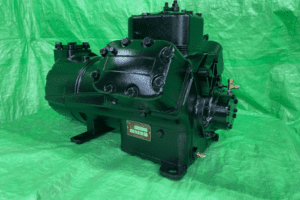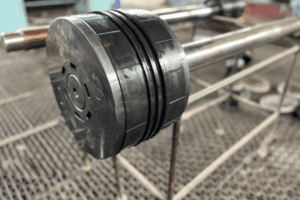

Problems with the refrigeration system can cause a major loss for grocers, up to and including the loss of all inventory on the floor. Since most stores run on a three-day inventory cycle, that means absorbing anywhere from $20,000 for a small store to twenty times that for a larger store.
As the property manager, it’s crucial to understand your refrigeration system, particularly the compressor. Even relatively minor mechanical issues can have a negative effect on the business.
The Role of a Refrigeration Compressor in Your Grocery Store
In the refrigeration process, cooling systems remove heat from a structure and carry it outside. Refrigerant fluids absorb heat from the interior air into the evaporator coil. During this process, the refrigerant transforms from a cool liquid to a warm, low-pressure gas.
The refrigeration compressor is the component that squeezes warm refrigerant gas, reducing its volume. This raises the pressure and temperature of the gas, allowing it to enter the condenser. From the condenser, an outside air current flows over the gas and removes the heat.
Refrigeration is an ongoing process. The compressor cycles continuously to ensure food safety. There are three different kinds of compressors commonly used in refrigeration – scroll, screw, and centrifugal. Some of the most popular refrigeration compressor models include the Copeland 4RA1000TSK and 6RA1000TSK, as well as the Carrier 06DR33761200, 06ET150620, 06EY099640 and Bitzer 6FE502NU.
The Two Types of Grocery Store Refrigeration Systems
There are two main types of refrigeration systems in use in mid-sized grocers and supermarkets:
Direct Expansion (DX) Refrigeration
Direct expansion systems are the most widely used. If your refrigeration system is more than ten years old, you probably have one. As above, DX relies on changing the refrigerant from liquid to vapor as it passes through the evaporator.
Because it’s physically impossible to maintain the same volume of material in the transition from liquid to gas, these changes deplete the refrigerant fairly rapidly. Depending on the size of the system and the demands placed on it, state changes can occur hundreds of times a day.
Although the performance quality of secondary loop refrigeration systems tends to be superior, more contractors are familiar with the ins and outs of the DX system. That includes how to care for its key components: The compressor, condenser, expansion valve, and evaporators.
Secondary Loop (SN) Refrigeration
In SN refrigeration units, there’s no change in the physical state of the secondary coolant that circulates through the cases. Glycol fluid is used, giving the system the same ability to absorb heat through the secondary heat exchanges without actually boiling the coolant.
There are some significant advantages to an SN refrigeration system:
- They use about half as much refrigerant as traditional DX ones
- Installation of an SN system does not require line evacuation
- Less copper can be used than in a comparable DX system
- SN systems usually require less annual maintenance than DX
- Capacity control is higher and leak risk is lower in SN refrigeration
Remember that many older units may use HCFC refrigerants that are due to be phased out in January 2020.
HCFC supplies will become prohibitively expensive over time, so units should be replaced or retrofitted when possible. These changes are a major factor driving the rapid adoption of next generation SN refrigeration units. More contractors are learning to install and service them, too.
No matter which type you have, your compressor remains the heart of your refrigeration system. Aside from scheduled maintenance by experts, maintaining refrigerant levels is one of the most vital steps in reducing load and wear on internal components.
Should You Repair or Replace Your Refrigeration Compressor?
When there is a mechanical failure within the compressor unit, it may need to be replaced.
It’s the nature of the grocery business that by the time you become aware of refrigeration issues, they may already be affecting food quality. Many problems are difficult or costly to repair. A remanufactured refrigeration compressor from Compressors Unlimited, on the other hand, is a reliable choice.
When you are in the market for a new compressor, always choose one that comes with a strong warranty. You should expect comprehensive coverage for defects in workmanship and materials.
Remanufactured compressors let you reduce cost and risk. A remanufactured unit has been completely rebuilt to meet like-new specifications. That means it meets or exceeds current OEM standards and compatible with new technologies.
In a grocery store, your refrigeration compressor is just as essential as the building’s roof – your business depends on it, and no one is safe if it’s not working correctly. For personalized advice from refrigeration experts, contact Compressors Unlimited today.


